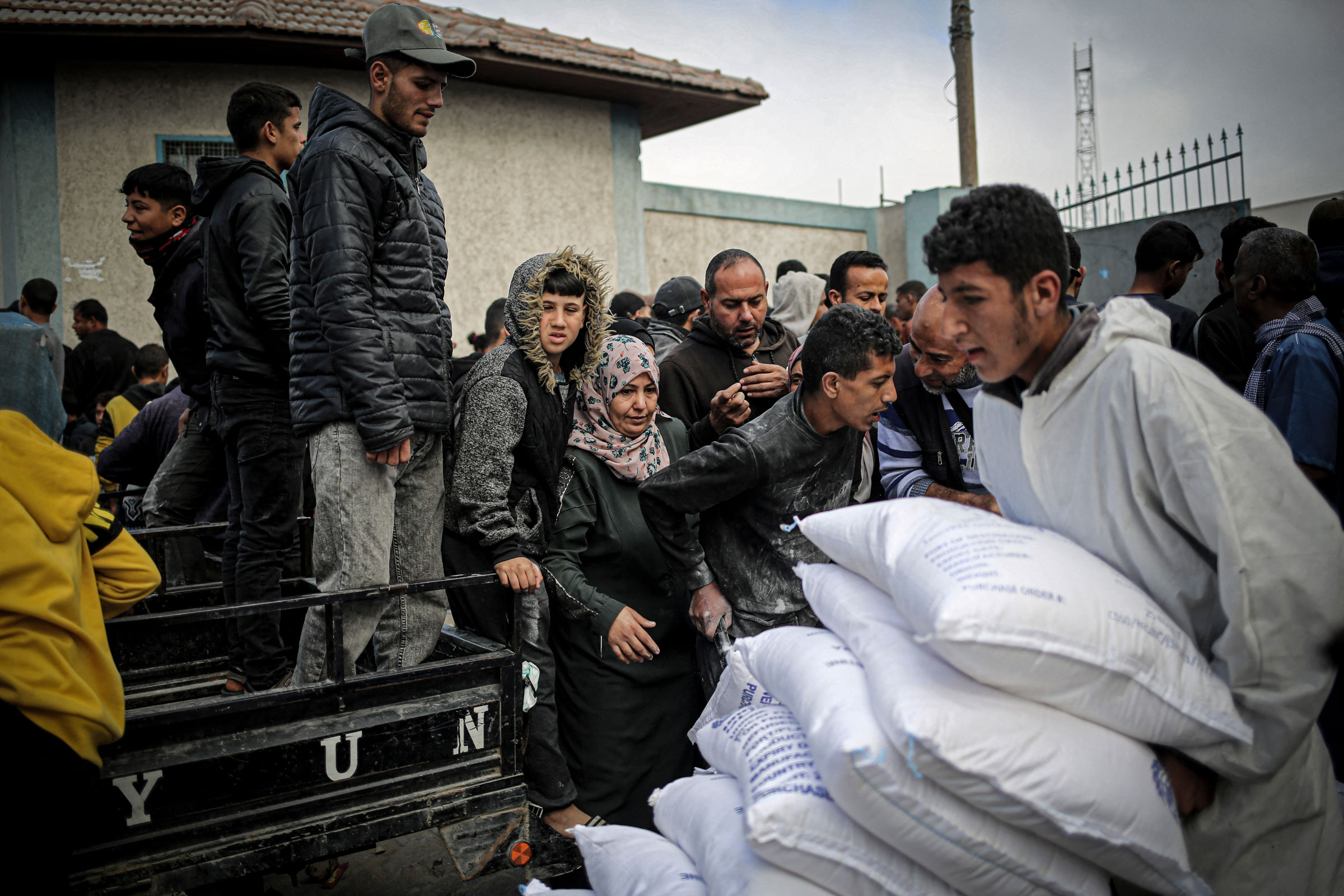President Joe Biden plans to order the U.S. military to establish a temporary port along the coast of Gaza in the coming weeks to allow more humanitarian aid to reach Palestinian civilians, senior administration officials said Thursday.
Biden plans to announce the “emergency mission” during his State of the Union address on Thursday evening. “We are not waiting on the Israelis," a senior official told reporters, signaling the administration’s growing frustration with its ally. “We know the aid flowing into Gaza is nowhere near enough and nowhere near fast enough.” The operation will establish a port on the Mediterranean on the Gaza coast that will be able to receive large ships with food, water, medicine and temporary shelters.
Officials on Thursday insisted the Biden administration is "not planning for this to be an operation that would require U.S. boots on the ground," saying the U.S. will be able to carry out the work "from just offshore." The shipments of supplies would come from the port of Larnaca in Cyprus, and be delivered from the pier in Gaza with the help of U.S. partners including the United Nations and other humanitarian agencies. The U.S. forces required to carry this out "are either already in the region or will begin to move there soon," officials said.
Read More:For Antony Blinken, the War in Gaza Is a Test of U.S. Power
The announcement comes amid growing criticism from Biden’s own party, and calls for him to take a more aggressive stance with Israeli Prime Minister Benjamin Netanyahu to bring the war to an end as quickly as possible. Still, in Thursday's address, Biden is set to defend his administration's approach to Israel's war in Gaza, which has killed more than 30,000 Palestinians according to the health ministry there, and displaced what the UN estimates is 80 percent of the population. He will speak about the Oct. 7 attacks and the war "in a very personal way," a senior administration official told reporters, and will reiterate "Israel's right to go after Hamas and those responsible."
More from TIME
Since the beginning of Israel's military offensive after the Oct. 7 attacks by Hamas, senior U.S. officials have implored Israel publicly and behind the scenes to allow humanitarian aid to reach the enclave’s increasingly desperate population. In the early days of the war, Secretary of State Antony Blinken used a visit by President Biden as leverage to allow the first trucks to cross into Gaza, U.S. officials told TIME last year. In an interview in December, Blinken acknowledged that the amount of aid reaching Gazans was “totally insufficient in terms of what was actually needed."

Since then, the need has only grown more dire despite the Biden administration's increasingly sharp rebukes. “People in Gaza are starving. The conditions are inhumane," Vice President Kamala Harris said on March 4, a day before she was due to meet with Benny Gantz, a member of Netanyahu's war cabinet. "The Israeli government must do more to significantly increase the flow of aid. No excuses.”
Senior United Nations officials last month warned that one quarter of Gaza's population is “one step away from famine." In a recent visit to northern Gaza, World Health Organization confirmed at least 10 child deaths from starvation. On Feb. 29, more than 100 Palestinians were killed after witnesses say Israeli troops fired on a crowd that was trying to access trucks of food aid.
In what amounted to further acknowledgement that the situation is spiraling out of control, the U.S. began to deliver food to Gaza through military airdrops last week. It has been an unusual operation, dropping aid into a territory that is controlled by a close ally that the U.S. is continuing to arm. “None of these—maritime corridor, airdrops–are an alternative to the fundamental need to move assistance through as many land crossings as possible,” a different senior administration official told reporters March 2. “That's the most efficient way to get aid in at scale. It’s the most efficient way to flood the zone."
More Must-Reads From TIME
- The 100 Most Influential People of 2024
- Coco Gauff Is Playing for Herself Now
- Scenes From Pro-Palestinian Encampments Across U.S. Universities
- 6 Compliments That Land Every Time
- If You're Dating Right Now , You're Brave: Column
- The AI That Could Heal a Divided Internet
- Fallout Is a Brilliant Model for the Future of Video Game Adaptations
- Want Weekly Recs on What to Watch, Read, and More? Sign Up for Worth Your Time
Write to Vera Bergengruen at vera.bergengruen@time.com